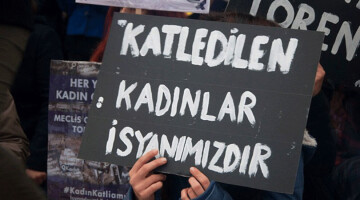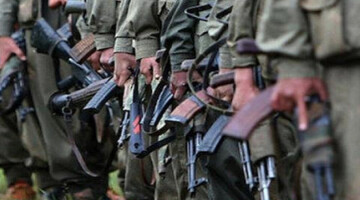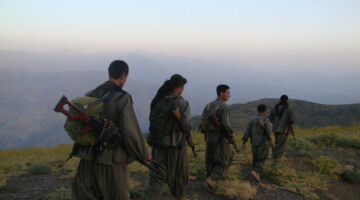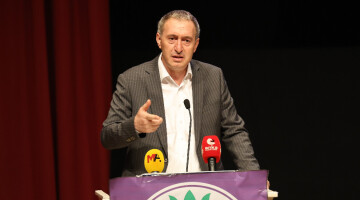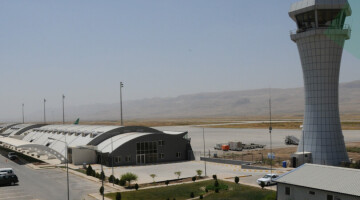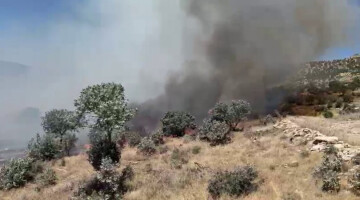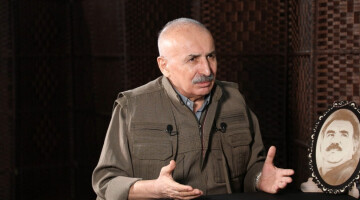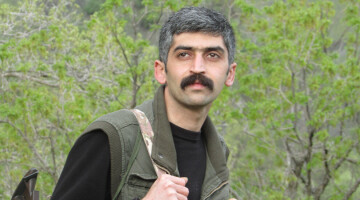More and more soldiers join the guerrillas because of the ill-treatment and racist oppression they experience in compulsory military service. People's Defense Forces (HPG) member Çayan Koçgirî is one of the young men who did not accept the oppression in the Turkish military and joined the Kurdistan Workers' Party (PKK). ANF talked to the Turkmen guerrilla fighter.
Could you tell us something about the environment in which you grew up? What were your first contradictions with the system? Where does your sympathy for the PKK come from?
I was born in 1992 in Sivas and grew up in Istanbul. In the neighborhood where we lived there was a democratic majority. Therefore, in the culture of the neighborhood there was always an opposition to the state. I am Alevi and I grew up in a democratic family of Turkmen origin. In my eyes, the PKK has always been a movement fighting against the Turkish state.
Already as a child I experienced the contradiction with the state and took part in protest demonstrations. I participated with sympathy and became part of the revolutionary movements of Turkey. As my understanding of the contradictions of the system grew and I became more aware, many of the actions we had done in the name of the revolution seemed liberal and simply no longer enough for me.
Before our eyes many massacres took place and we were like paralyzed. We felt as if our hands were tied. After the Roboski massacre, I became more involved with the PKK. The PKK was portrayed very negatively in our territory within the framework of the special war policy of the state. That has always raised questions with me. In 2009, the bridge of revolutionary youth was opened in Hakkari. We went there and the only thing the people said to us was, "When you leave, tell the people there about us." I experienced and saw it there. That's why I quickly understood what's really going on.
How did you become a soldier of the Turkish state amid such contradictions?
In my family, I grew up with such contradictions. At that time, I was also arrested several times. When they heard about my involvement with the PKK, my family began to treat me differently. They said the time had come for military service, and they forced me to join the military. For me it was absurd to become a soldier of the criminal gang of an oligarchy that I had always fought against. But it was like there was no way out. On the other hand, my trial continued. So I was kind of forced to leave.
During the time you served in the military service, how was the intensity of the war?
I went to Samsun in a unit of new recruits. After 25 days in this unit, they woke us one day and informed us about the arrangement of new service place. I did not understand how I endured the training period. The training created a robotized human type. Then I was told that I would be sent to Yüksekova, Hakkari.
At first, it felt like a joke to me. It was the year 2012, when the war had reached the highest intensity. Some friends from my neighborhood were with the guerrillas. Because of such contradictions, it was very difficult for me to go to Hakkari as a soldier. In 2012, the Turkish state practically collapsed there. The military could not even bring food to the military bases. If the guerrillas had continued the siege for another month, then all the military bases would have been abandoned by the Turkish troops. That process was very difficult for the Turkish state. Their troops could not get to their own bases and had to stop the activities on the ground completely.
I first went to the acceptance center (KTM) in Elazığ. Normally, they would not let you wait there for a long time, but as I said, at that time the Turkish state was collapsing in the region. Not even a convoy could drive out. On the road to Bingöl guerrillas had carried out an action against a military convoy, in which 110 soldiers were killed. The soldiers were really scared. When we drove to Hakkari and the new recruits saw the high mountains, they were literally shaking with fear.
Gever was a bit flatter and that calmed the soldiers. They thought that where there are no mountains, there are no guerrillas. But there were permanent actions by guerrilla forces in that region too. I remember so many dead bodies of soldiers I carried away at that time. I saw how the soldiers fled. I witnessed all these things with my own eyes.
The media always praises the ‘glorious Turkish army’. As an eyewitness of the war, what do you have to say in this regard? Is it really like what is reflected in the media?
Nothing is like what is reflected in the media. I experienced this myself. In the media, they say the Turkish army continuously bombard guerrillas with repeated discourses and slogans about the homeland, the nation and so on before the cameras. However, once the cameras are turned off they say the most vicious swear words. Once guerrillas carried out an action with mortars. I saw the panic of the soldiers. They kept calling the commander, saying, "My commander, help us." After the mortar strikes stopped, the commander came and looked at me and said, "Well, you haven’t died yet." I was his soldier and he could just say something like that to me. This is normal for them and of course causes a contradiction.
You know, they are enemies, but also soldiers next to me felt these contradictions. In every battle they said: "So many terrorists have been killed." But the soldiers no longer believed it. For example, it was claimed that Cobra attack helicopters had taken off, though not a single one did so. We saw that, because the cobras were right under our noses. Soldiers saw all this.
They were especially watching the video footage of guerrilla actions published by Gerîla TV and the soldiers were feeling really bad. They no longer believed in the technique of the Turkish army. The state was already breaking the will of its own soldiers before the war. It's not about Turks against Kurds, but they were against the nature of humanity itself. The reason for the existence of the state is based on the annihilation of all good.
I would like to give another example. At the time of Martyr Reşit, an operation took place in Xapûşke region in autumn and three soldiers were injured. The soldiers asked for help. The state did not come to pick up its soldiers. Then the soldiers were swearing why no one came to their rescue. But that is the attitude of the state towards its own soldiers. Then a helicopter took off to get them, but the guerrillas hit the helicopter as it tried to land. When the helicopter came back, it was drenched in blood inside. We then took the bodies out of it. When the guerrillas retreated from the area, the Cobras were mobilized and bombed an empty area. The state acted according to the motto: "Mothers give birth to new soldiers, but cannot give birth to new Cobras”.
In the media is repeatedly talked about "suspicious deaths" in the army. What is your experience about this?
Once a soldier died next to us. It was said to be a suspicious death. But we all knew he had been deliberately killed. It had snowed. What they told was that there were two grenade launcher cartridges there and then they collided and exploded, thus killing him. We were told it was an accident. But since we knew the oppression practiced against our own soldiers, we did not believe it for a moment. The state covered up the incident. To become a victim of a "suspicious death" is enough to not accept a cause. And anyway, if you're Kurd, Alevi or Turkmen, then you're even easier on this list. 99 percent of the so-called "suspicious deaths" are deliberate murders.
How did you decide to join the PKK?
I had just left the tenth month of my military service behind me and I had seen enough. At that time, I told myself, "It's time to get out of here." Otherwise, I would have become a person who is tied to the family and whom the state would try to discipline. I felt debted. At that time Sakine Cansız had been murdered. When I saw that on TV, it moved me a lot. The "solution process" had begun and there was the call of the Leader. I did not know the party very well then, but I could not digest the guerrilla forces’ retreat because I never trusted the state.
At that time began a period in which soldiers could easily get a daily vacation. Of course, there was not such a thing before. They were afraid. The situation among the soldiers got a bit relaxed. I said, I wanted to go on vacation. It was the time of Gezi protests and there was a revolution atmosphere. Berkin Elvan was from our neighborhood. At that time I decided: "Now is the time, I will not return to the military." At that time, the process of Rojava war had begun and the Turkish state had carried the war into Rojava. Then I joined the PKK.
What is the systemic difference between the guerrilla and the Turkish military?
I joined the PKK. Of course that's a huge difference. While I had been a soldier of the Turkish army a week before, the transition to HPG's system unavoidably seemed a bit strange. In the beginning, many things within the PKK seemed strange to me. I could not understand what was meant by report, criticism and self-criticism. I had just from a degenerated environment full of swear words and insults to the PKK.
There was really a profound difference. I also knew the psychology of the Turkish state. The system of the Turkish army is based on special warfare and technology. Each soldier was counting the days until the end of the 15 months military service. But that was not the case with the guerrillas. There was a bond, yes, a spirituality. There was a goal. There was a fight for the oppressed peoples. The PKK was like an ocean. When I read the defenses and the analyzes, I understood everything better. It was good for me to get to know and experience the atmosphere here and to analyze some things. I see the reality very clearly now.
You got to know military life for the Turkish state and life in the PKK up close. What do you want to say on this background, especially to the Kurdish youth?
Today in both Kurdistan and Turkey severe repression, massacres and the like are taking place under the state of emergency. We must not forget what happened in Cizre and Sur. The state’s goal is to make the people retreat into silence while actually everyone has to speak louder. My call is not only to the Kurdish youth, I address my words to all young people suffering from the oppression in Turkey. In a monistic system where freedom and free will have no place, life is sheer slavery. Therefore, all young people should refuse the Turkish military service and join the guerrilla. The fight of the guerrilla is not only a Kurdish fight, it is the struggle of all peoples. People should not continue to be a servant of the system.

